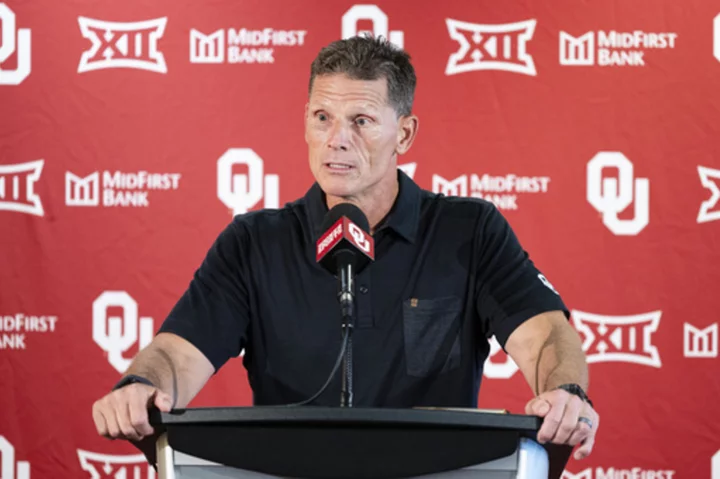Conference realignment has widened the recruiting footprint for Power Five college football programs long before many teams open play in their new league homes.
Oklahoma and Texas accepted invitations to join the Southeastern Conference back in 2021 and programs have been adjusting ever since. The dominoes continue to fall, with the SEC and Big Ten getting stronger, the Big 12 expanding, the Pac-12 left as a shell of its former self and the Atlantic Coast Conference facing angst from the likes of Florida State.
The Big Ten has seen the most significant shift, at least in terms of geography. With Southern California, UCLA, Washington and Oregon leaving the Pac-12 for the Big Ten next year, the sprawling conference will boast programs from the West Coast all the way to New Jersey.
The only domestic time zone missing from the Big Ten will be Mountain.
“For recruiting purposes, it sort of shrinks the idea of of going far away from home,” said Adam Gorney, the national recruiting director for Rivals. “If you were a kid in Arizona and you were a little hesitant to go to Ohio State, well, you are going to come back and play in the West once or twice, three times a year now.”
Realignment also has made conference stability a more critical recruiting piece as young men try to figure out exactly what they are getting into.
“Recruiting is a game of inches, and you never know which inch is going to be the one to add up for you having a prospect go in your favor,” said Steve Wiltfong, director of recruiting for 247Sports. “Once you solidify your future, it allows prospects to know what that road map looks like from their perspective.”
ACCFlorida State President Rick McCullough believes the Seminoles will have to consider leaving the ACC unless there is a “radical change to the revenue distribution.” That kind of uncertainty can affect other members of a conference, especially with the issues coming from one of the league's marquee members.
The ACC has had talks about adding Pac-12 members California and Stanford — Gorney said that would be an upgrade for both schools — but the ACC has not agreed to anything at this point. Such additions would expand the ACC to the West Coast. But that impact might be lessened if a program such as Florida State leaves. And the longer uncertainty looms, the harder it is to recruit.
BIG 12Things looked bleak for the Big 12 when Oklahoma and Texas chose to switch, but the league added Houston, BYU, Cincinnati and Central Florida beginning this season.
The new schools were not in Power Five conferences last season. The jump already is paying off for UCF coach Gus Malzahn, who has used his new tool when going head-to-head with Miami, Florida and Florida State for players.
“It’s a huge advantage,” Malzahn said. “Now that we’re in the Power Five recruiting, we recruit against the three larger schools in the state, and it’s been a game changer as far as that.”
BYU coach Kalani Sitake said his program also is drawing more interest.
“I think it increases, maybe gets a little bit of curiosity for people that never thought about BYU as a destination to play,” he said. “It’s just opened the doors and widened our net in recruiting.”
Next year, the Big 12 will grow again when it adds Colorado, Arizona, Arizona State and Utah from the Pac-12.
BIG TENOregon immediately became a more attractive destination once it joined the Big Ten. Days after the announcement, USC commitment Dakoda Fields, a highly ranked cornerback, flipped to Oregon.
The move underscores the fact that USC will not be alone out West in enjoying the perks of Big Ten membership. Like USC, the Ducks will get to play on some of the biggest stages in college football — Michigan, Penn State and Ohio State — when they join the conference in 2024.
“The exposure they’re going to get and the development they’re going to be able to see for NFL purposes is absolutely huge,” Gorney said.
Nebraska, a Big Ten program that has seen its influence shrink, could regain some of its West Coast reach that landed the Huskers greats such as Jarvis Redwine, Steve Taylor and Lawrence Phillips from California in past generations.
“I don’t think Nebraska is going to come in to California and have half of their class be California players,” Gorney said. “But there could be wins there along the line that weren’t there before because now USC and UCLA are in that conference.”
Gorney said a downside could be the newest Big Ten schools running into problems when West Coast recruits consider braving the cold and snow late in the season.
PAC-12Remaining Pac-12 members Washington State, Oregon State, Stanford and California may have the uncertainty of their conference's future used against them in living rooms across America.
“I’ve just always believed that negative recruiting is recruiting, and it’s been happening as old as time,” Wiltfong said. “Has everybody weaponized that negative recruiting? No, not necessarily. But it is certainly a topic of discussion that could come up? Absolutely.”
The remaining Pac-12 schools need to be careful about their next move. Gorney said joining the Mountain West or American Athletic conferences will hurt them because the quality of competition will drop.
Gorney said Stanford and Cal may not be affected as negatively as Washington State and Oregon State because players often attend those schools for reasons beyond football. But Oregon State and Washington State are in remote locations that struggle to recruit anyway. Losing their rivalries against Oregon and Washington if those matchups don't continue also would mean the loss of a key recruiting tool.
SECTexas and Oklahoma will combine their great histories with membership in the nation's strongest football conference when they begin SEC play in 2024, making them even bigger threats on the recruiting trail.
Oklahoma has been touting the move when making its case to recruits.
“When you can promote (playing) Alabama, South Carolina and Tennessee, or promote going on the road to Baton Rouge (Louisiana) or to Auburn, Alabama, or to Oxford, Mississippi — it gets the people charged up,” Oklahoma coach Brent Venables said. “I love creating vision. I love talking about the future, and they like it when you can create vision for them and they can see it.”
___
AP college football: https://apnews.com/hub/college-football and https://apnews.com/hub/ap-top-25-college-football-poll









